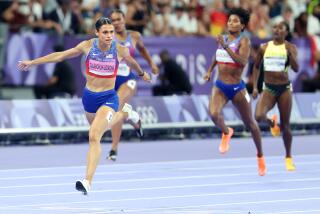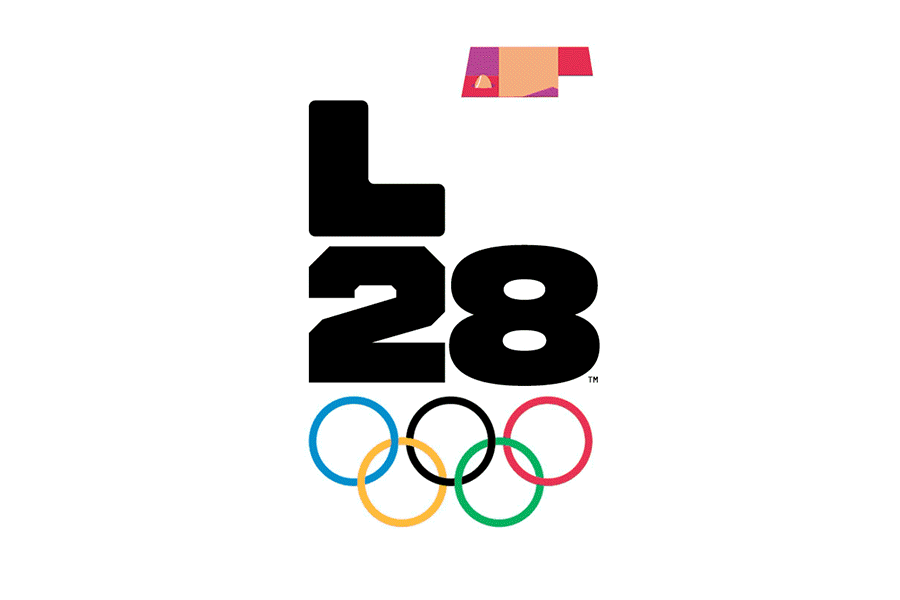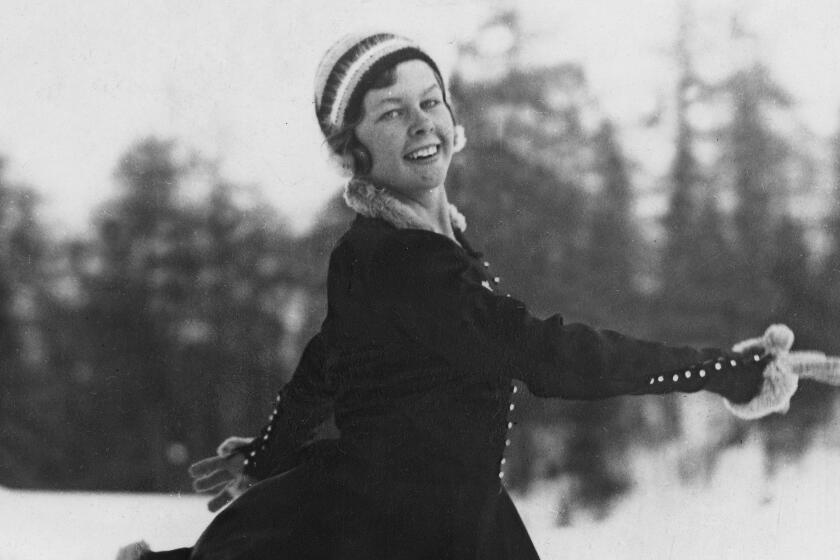U.S. TRACK AND FIELD TRIALS : A New Lewis (Steve) Is a King for the Day : UCLA Frosh Sets World Junior 400-Meter Mark; Carl Rallies to Win Long-Jump Competition
Maturing daily, UCLA freshman Steve Lewis is no longer even thinking about the junior world records he breaks almost every time he steps onto the track in the 400 meters. Now he’s going after the one the grown-ups have been chasing for 20 years, the 43.86 run by Lee Evans at the 1968 Olympics at Mexico City.
Coasting for the last 20 to 30 meters because, after all, it was only a semifinal, Lewis, 19, ran 44.11 Monday night at the U.S. Olympic track and field trials. That is the fifth-fastest time in history under any conditions and the second-fastest at sea level, trailing only the 44.10 run by Butch Reynolds last year at Columbus, Ohio.
For the first time, he also beat his UCLA teammate, junior Danny Everett, who, also shutting down in the final 30 meters, was second to Lewis in the heat with a personal best of 44.32, not bad for an old man of 22. Only nine men in history have run faster.
Their performances were so astounding that a rain-drenched crowd at Indiana-Purdue University Stadium almost forgot, for a while at least, the other Lewis, old what’s his name, the guy who won four gold medals at the 1984 Olympics at Los Angeles and appears capable of duplicating the feat this year at Seoul.
All Carl Lewis did Monday night, after winning two preliminary heats in the 200 meters earlier in the day, was equal the fifth-best performance of all time in the long jump at 28 feet 9 inches, which he needed to beat Larry Myricks, whose 28-8 was the eighth best jump of all time.
In winning his 55th consecutive long-jump competition, Lewis came from behind twice to beat Myricks. Lewis later called it the best competition of his career.
Best is a word that has been used often since the trials began Friday. As in, this is the best meet in terms of performances that many veteran track and field observers can recall seeing since the 1968 Olympics. Florence Griffith-Joyner’s 10.49 in the 100 meters Saturday, for instance, seems no less spectacular than Evans’ 43.86 or Bob Beamon’s 29-2 1/2 long jump in Mexico City, and those records were set at high altitude.
The other trend that has developed here is the domination of so many events by athletes who either were born and reared or trained in Southern California. It’s become apparent that a Los Angeles-area city championship would rival anything that the East Germans can do.
Start with the two world records set so far, one in the 100 meters by Griffith-Joyner, an L.A. Jordan High School and UCLA graduate, and one in the heptathlon by Jackie Joyner-Kersee, also a UCLA graduate who has trained in Los Angeles since she left her native East St. Louis in 1980.
Then there were Monday’s results.
Steve Lewis attended Banning High School as a sophomore, moved to Fremont in Northern California and returned last fall to enroll at UCLA. Everett graduated in 1985 from Fairfax High School.
Johnny Gray, who graduated from Crenshaw High School in 1978 and has been training at Santa Monica, won the 800 meters in 1:43.96 to earn a berth on his second Olympic team.
The women’s 800-meters winner, Kim Gallagher, who ran a trials record 1:58.01, attended high school in Ambler, Pa., but also has been training in Santa Monica since 1983.
Donna Mayhew, a 1978 graduate of Crescenta Valley High School, won the women’s javelin with a throw of 208-10. It was the third-best American mark ever, and it broke her personal record by 14 feet.
Denean Howard, who graduated from Kennedy High in Granada Hills in 1982 and Cal State Los Angeles in 1986, finished second in the women’s 400 meters in 50.40, and Valerie Brisco, the winner of three gold medals in 1984 who graduated in 1978 from Locke High, finished third in 50.53. Diane Dixon, a New Yorker, won in 50.38.
Mike Powell, a graduate of West Covina High School in 1981 and UCLA in 1986, after three years at UC Irvine, finished third in the long jump, dramatically postponing his best effort until last, when he jumped 27-5.
After fouling on four attempts, it appeared as if Powell, who jumped 27-8 in the qualifying competition Sunday for his personal best, might not make the Olympic team. But when he did, he leaped into the arms of his training partner, Willie Banks, still another UCLA alumnus who won the triple jump Saturday and had vaulted out of the bleachers to congratulate Powell.
The man who coaches them both at UCLA’s Drake Stadium, Randy Huntington, seemed stunned when Powell made the team, rightly so because the long jumper underwent an appendectomy May 15.
“What he just did is incredible,” Huntington said. “If some of those earlier jumps hadn’t been fouls, I feel he would have been out there with Carl and Larry.”
Carl and Larry, of course, are in a class by themselves among U.S. long jumpers. Other than them, Beamon is the only American who has ever jumped more than 28 feet.
Myricks, third at the 1987 World Championships, first put pressure on Lewis Monday night with a 28-0 3/4 on his second jump. Lewis easily is capable of that, but he had not jumped beyond 28 feet this year.
While concentrating at the end of the runway for his second jump, the second downpour of the day began. The first, coming in the early afternoon, delayed the meet for 35 minutes and, mercifully, dropped the temperature from 90 to 74 degrees. This one would cause a 23-minute delay.
But Lewis insisted on jumping before the officials stopped the meet, and he took the lead with a jump of 28-2.
Unfazed, Myricks, a Mississippi native who lives in Ontario, came back on his third attempt with the best jump of his life, 28-8.
“That raised the competition level,” said Lewis, who has not lost in the long jump since Myricks beat him during the 1981 indoor season. “If I didn’t respond on the next jump, who knows what would have happened?”
Lewis responded with the best jump in the world this year, 28-9.
Now a member of the U.S. team in the 100 and long jump, he turns his attention to the 200, in which the semifinals and final will be run Wednesday.
But he may again be overshadowed that night by the 400-meter runners, Steve Lewis, Everett and Reynolds, who won his semifinal heat Monday night in 44.65. The competition in the 400 is so loaded that two men who have run faster than 45 seconds the last two days did not qualify for the next round.
John Smith, who coaches both Lewis and Everett at UCLA, said he expected Lewis to run fast this year, but not this fast. He has broken the junior world record four times, including twice on consecutive days. He ran 44.61 in the second round Sunday.
“I still don’t know what the hell I’m doing with him,” Smith said. “He’s surprised me. He said before this season started that his goal was to run 44.5. Bob Larsen (UCLA head coach) thought he was some hot-shot freshman shooting his mouth off. I said, ‘Bob, don’t laugh. He’s serious.’ ”
Smith said he believes Everett, the National Collegiate Athletic Assn. champion, should be favored because he is more experienced and has a better kick.
But he said either, after a day off today, could break Evans’ record Wednesday night. Smith said he expects them, and maybe Reynolds, too, all to run faster than 44 seconds.
“This is a wonderful track, the fastest in the world,” Smith said. “If the conditions are right, they should be running that fast.”
More to Read
Go beyond the scoreboard
Get the latest on L.A.'s teams in the daily Sports Report newsletter.
You may occasionally receive promotional content from the Los Angeles Times.





